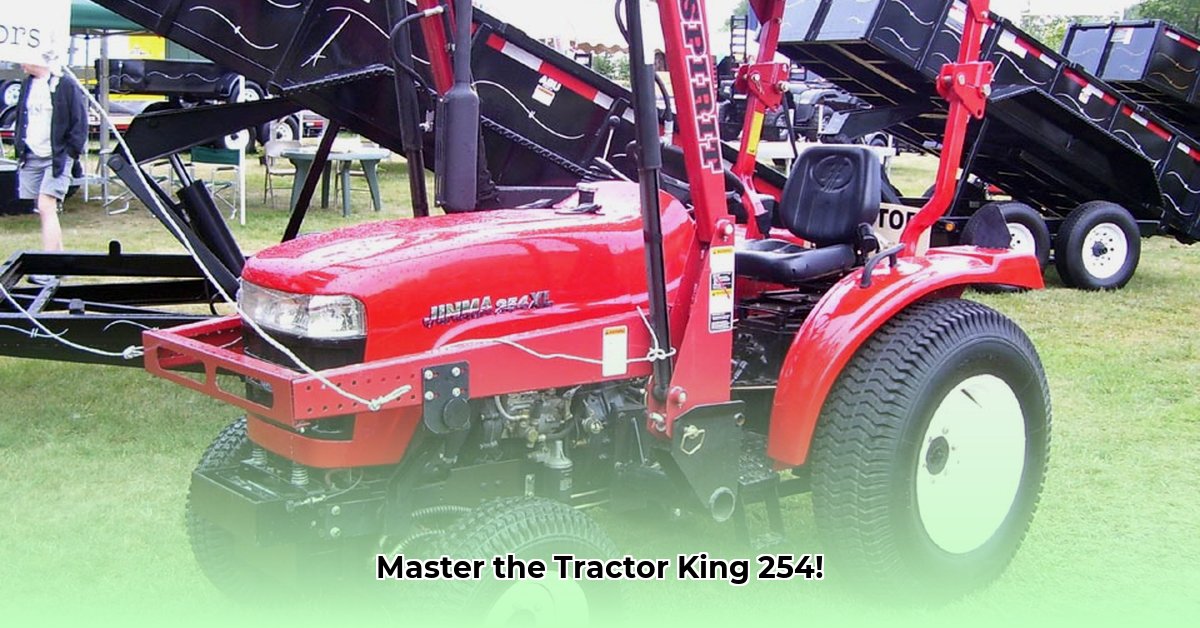
Tractor King 254: Is This Compact Tractor Right for You?
The Jinma JM-254, often dubbed the "Tractor King 254," presents a compelling option for small-scale farmers seeking affordable mechanization. But is this compact tractor the right fit for your specific needs and budget? This review delves into its performance, value, and long-term considerations, empowering you to make an informed decision. For more information on tractor parts, check out this helpful resource: tractor parts.
Power and Performance: A Mighty Mite?
The JM-254 boasts a 25-horsepower diesel engine, sufficient for various tasks such as tilling, mowing, and hauling lighter loads. Its four-wheel drive ensures excellent traction on uneven terrain. The hydraulic system, while straightforward, effectively operates most basic implements. However, its 875-pound lift capacity limits its suitability for heavier equipment. It's a reliable workhorse for smaller jobs, but not a powerhouse for heavy-duty applications. Is a 25-horsepower engine sufficient for your primary farming tasks? Consider the weight of the implements you'll use.
Price and Value: Budget-Friendly or Too Good to Be True?
The JM-254's affordability is a significant advantage, especially for farmers with limited budgets. It offers good value for its price point, but this often comes with compromises. How does the initial cost compare to potential long-term maintenance expenses? This is a crucial question to consider when evaluating its true value proposition.
Maintenance and Reliability: The Unknown Factor
A significant drawback is the scarcity of readily available, independent long-term data on JM-254 reliability and maintenance needs. Assessing fuel efficiency and upkeep requires diligent research involving owner forums and discussions with other users. Have you considered the potential challenges in obtaining parts and finding qualified mechanics for repairs? This is vital to anticipating potential downtime.
Environmental Impact: Thinking Green
Information regarding the JM-254's emission standards is limited. This lack of transparency presents a challenge for environmentally conscious farmers. Are the emission levels of this tractor suitable for your concerns about sustainable practices? This lack of readily available information is a notable drawback.
Weighing the Pros and Cons: A Balanced View
This table summarizes the advantages and disadvantages to facilitate your decision-making process.
| Pros | Cons |
|---|---|
| Relatively Low Purchase Price | Limited lift capacity; unsuitable for heavy tasks |
| Four-wheel drive for excellent traction | Limited independent reviews and long-term data |
| Well-suited for smaller farms and operations | Potentially higher long-term maintenance costs |
| Simple, effective functionality for basic tasks | Uncertain emission standards and environmental impact |
How to Compare Jinma JM254 to Other Compact Tractors for Small Farms
Choosing the right compact tractor requires careful comparison. While the JM-254's affordability is attractive, it's essential to weigh its capabilities against those of competitors.
Understanding the JM-254's Niche
The JM-254 serves as an accessible entry point for small-scale farmers, particularly those on tight budgets. However, its lower cost may translate to higher long-term expenses. Will the initial savings outweigh the potential costs of repairs and maintenance? This should significantly influence your purchasing decision.
Factors to Consider When Comparing
When comparing the JM-254 to other compact tractors, consider the following:
- Price: The JM-254 typically has a lower upfront cost, but long-term expenses must be factored in.
- Durability/Reliability: User reviews provide varied experiences; meticulous research is crucial.
- Maintenance/Repair: Assess the affordability and accessibility of parts and qualified mechanics.
- Features/Capabilities: Evaluate the JM-254's suitability for your specific farming tasks.
- Warranty: A comprehensive warranty can mitigate risks associated with less-established brands.
A Practical Comparison Approach
- Define Your Needs: List your farming tasks and property size to determine required horsepower and capabilities.
- Research Competitors: Explore tractors from Kubota, Mahindra, Yanmar, and other established brands.
- Compare Specs: Create a spreadsheet comparing horsepower, lift capacity, three-point hitch capabilities, etc.
- Read Reviews: Carefully examine both positive and negative user reviews from various sources.
- Calculate Total Cost: Account for initial cost, maintenance, parts, and potential repairs.
- Test Drive (if possible): Experience each tractor to assess its comfort, responsiveness, and ease of use.
Pros and Cons of the Jinma JM254 (Summary)
| Pros | Cons |
|---|---|
| Affordable initial purchase price | Potential for higher maintenance and repair costs |
| Suitable for light-duty tasks | Parts availability and sourcing can be challenging in some areas |
| Relatively easy to operate | Durability and reliability can vary among models and importers |
| Access to a large selection of implements | Lower resale value compared to established brands |
Key Takeaways: The Jinma JM-254 offers a low initial cost but potential for higher total cost of ownership. Thorough research, realistic budgeting, and direct comparison with competitor models are crucial for successful decision-making. Consider the long-term implications beyond the initial purchase price.